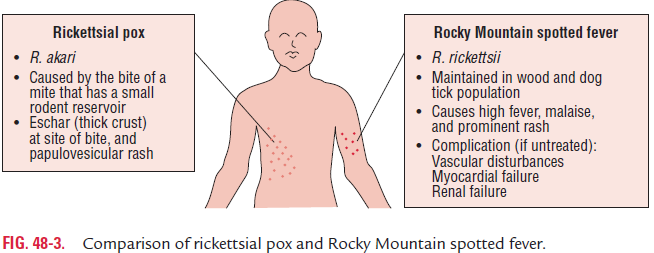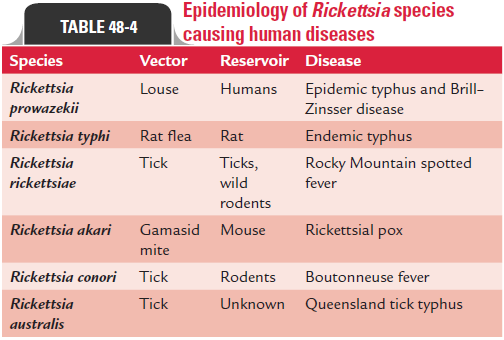Chapter: Microbiology and Immunology: Bacteriology: Rickettsia, Orientia Ehrlichia, and Coxiella
Rickettsia akari
Rickettsia akari
Rickettsial pox caused by R. akari is prevalent worldwide. It has been reported from Russia, South Africa, and Korea. Common house mouse (Mus musculus) is the natural reservoir. R. akari is transmitted from mouse to mouse by the bite of the mouse mite (Liponyssoides sanguineus). The infection in the mite is trans-mitted to the progeny transovarially (Fig. 48-3).

The incubation period is 7 days. The condition manifests by development of papule at the site of the bite by the mite.
Subsequently, the papule progresses to an ulcer and then it leads to the formation of eschar. This is followed by develop-ment of fever, headache, malaise, and myalgia in 3–10 days. A generalized papular vesicular rash usually appears 3–4 days after the emergence of fever. The illness lasts for a short dura-tion of 10–14 days, after which recovery occurs. Complete heal-ing of rash occurs within 2–3 weeks without treatment.
The rickettsial pox is clinically is a mild form of infection. Like other rickettsial infections, diagnosis of the condition is clinically supported by serology. This disease is differentiated from other rickettsial infections by:
· The presence of an eschar at the site of bite of mouse mite,
· The presence of a vesicular pustular eruption, and
· A negative Weil–Felix reaction. Rodents are the natural host ofthe mite transmitting rickettsial pox in different parts of the world. Treatment with doxycycline or chloramphenicol is highly effective for rickettsial pox infections.
The epidemiology of rickettsial species causing human diseases is summarized in Table 48-4.

Related Topics